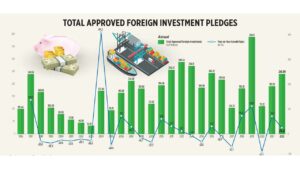What the new ‘Saudi First’ policy means for oil and power

PRINCE Abdulaziz bin Salman has had enough. The Saudi Energy Minister, object of vitriolic criticism in Washington since he led the OPEC+ cartel into an oil output cut this month, said he keeps hearing: “Are you with us, or against us?” But the kingdom isn’t choosing sides, he told Wall Street’s good and great last week in Riyadh. “Is there any room for ‘We are for Saudi Arabia and for the people of Saudi Arabia?’”
If putting his country first was impolite, Prince Abdulaziz — son of King Salman, half-brother of Crown Prince Mohammed bin Salman — warned he would have no choice but to be rude. “I’m pro-Saudi,” he said.
It’s been the reigning message at the kingdom’s annual Future Investment Initiative conference last week — and one that matters for everyone else as oil hovers close to the $100-a-barrel barrier.
In conversations with senior members of the Saudi royal family, officials and local business people, it’s clear that Riyadh is embarking on what I would call a “Saudi First” energy, economic and foreign policy agenda. It’s a shift several years in the making, which will have consequences for the rest of the world, chiefly via oil prices, but also when it comes to shaping Middle East diplomacy and the fight against climate change.
The signs have been around for a while. Earlier this year, Prince Mohammed, who runs the day-to-day affairs of the kingdom, said he didn’t mind whether US President Joseph R. Biden understood his approach. “It’s up to him to think about the interest of America,” he told The Atlantic. Left unsaid: MBS, as Prince Mohammed is known, was concentrating on the Saudis’ interest.
What I heard last week in Riyadh is the manifestation of that thinking: a bolder, determined and ambitious kingdom, still allied with America, but at the same time unshackled from the almost 80-year-old relationship. It’s a nation now more focused on Asia and its top oil clients — China, India, Japan, and South Korea. Together, the four countries account for 65% of all Saudi oil exports.
Amid a turbulent world, shaped by the Russian invasion of Ukraine and the highest inflation in 40 years in America and the United Kingdom, the kingdom has emerged as one of the few economic and political winners. Saudi economic growth is the strongest inside the Group of 20 (G20) major economies and the country is flush with cash.
Even after the recently announced OPEC+ output cut, Saudi oil production will set the highest ever annual average at roughly 10.7 million barrels a day in 2022. On year-to-date oil prices and output, its gross annual petroleum revenues are set to rise to almost $400 billion, just a fraction below the peak set in 2008 when oil prices rose to an all-time high.
And yet, away from the Ritz Carlton hotel, where the annual “Davos in the Desert” conference took place, and the moneyed districts of Riyadh such as Al Olaya where bankers stay, Saudi Arabia is a relatively poor nation. Its GDP per capita stood at $23,500 in 2021, well behind the $45,000 of the United Arab Emirates and the $68,000 of Qatar. With the country’s population growing by about 600,000 people every year (projected to reach 36.2 million in 2022), Riyadh has to run hard to stay still.
And that’s a key reason behind “Saudi First.” A banker, with decades of experience in the country, summed it up to me this way: “They just need the money, really need it — and that means high oil prices.”
In the past, Riyadh was willing to accept lower oil prices, boosting production — or delaying cuts — for the benefit of Washington. Not anymore. With the economic outlook uncertain, it would rather err on the side of supplying too little rather than too much. If it is going to make a mistake, let that result in higher, rather than lower, oil prices. Mohammed al-Jadaan, the Saudi finance minister, told me Riyadh was simply doing what others inside the G20 were — looking after themselves.
“Look at the Federal Reserve: The Fed is increasing the rates, it’s impacting everybody else, but we understand this is a domestic issue, they need to deal with inflation,” he said.
Saudi officials are at pains to say they don’t have a particular price target. But from their actions it’s clear Riyadh wants to keep Brent crude as close to $100 a barrel as it can. Many diplomats here see $80 a barrel as an unofficial floor. And if aiming for higher prices helps Russia, which is in need of cash to bankroll the invasion of Ukraine, that’s just a byproduct of the policy. Put differently, Riyadh believes the OPEC+ cut is about business, not politics.
But Riyadh also no longer believes that its oil-for-security bargain with Washington is working as it once was. For decades, Riyadh kept oil prices under relative control and purchased American weapons. In return, Washington provided regional security, deploying its military might if needed, and diplomatic support, largely ignoring human rights abuses. Now the kingdom wants a far more aggressive stance against Iran and its regional proxies, including in Yemen, and it is flummoxed by how Washington has seemingly turned a blind eye to the black market on Iranian crude, allowing Tehran to cash in on high oil prices.
The alliance, Saudi officials and local business people say, is unbalanced: If Washington wants Riyadh to keep oil prices down, it will have to deliver the other side of the bargain, most likely putting pressure on Iran. But the kingdom is increasingly likely to ask for bigger favors in return. As with America First under Donald Trump, Saudi First is transactional.
Such a turn has significant consequences for global economies: Oil prices are likely to remain higher for longer, fueling inflation. For equity and bond investors in fossil fuel companies, it’s a sign the boom times may continue. For everyone else, it’s a starker picture.
And further in the background is a profound disagreement about how to manage the energy transition and the fight against climate change. The Saudis believe the world is putting too much focus on restricting fossil fuel supply and discouraging investment while demand is still growing. It’s an approach, perhaps, fit for the US and Europe, but not for the emerging world.
“We’re looking at it from a Western point of view and the rest of the world needs to adapt,” said Amin Nasser, the chief executive of state-owned oil giant Saudi Aramco. “No, it doesn’t work like that.”
It’s a sign of what’s to come. Be prepared to hear “no” from the Saudis much more often.
BLOOMBERG OPINION




